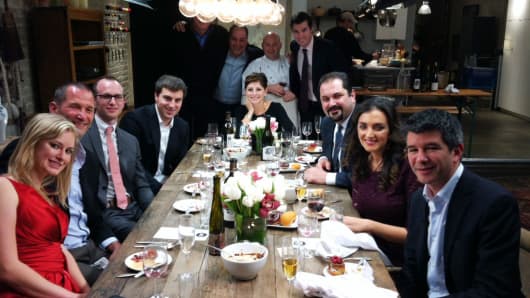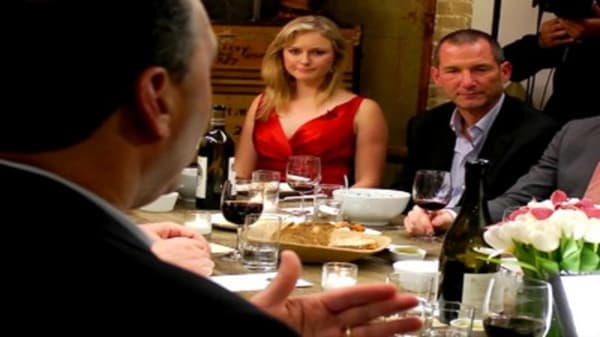Sitting down for this four course meal prepared by Chef Dan Kluger through private chef on-demand site Kitchit "are some of the most inspiring entrepreneurs I've ever met," said Co-Founder and Co-CEO of Sherpa Foundry Shervin Pishevar.
"The deepest thing," said Pishevar "is that these guys and gals are basically going after a business philosophy. This is a movement. "Combined with the growth rates of many of these companies—most founded within just the last five years—the prolific Silicon Valley investor says this trend is the most exciting of his career.
Pishevar invested $26 million in Uber, which reported growing more than 20 percent month over month in 2012. The geo-tracking app makes private cars and drivers available at any time to registered users at the touch of a finger. The company's CEO and founder, Travis Kalanick, said the straightforward consumer experience of pushing a button so "a Mercedes pulls up" provides better ways for urban dwellers to navigate transportation. Uber currently operates in 21 cities globally.
Peer-to-peer marketplaces like lodging rental site Airbnb and local car-sharing site Getaround offer individuals the chance to make money on their excess capacity of spare rooms and parked cars. Getaround's co-founder Jessica Scorpio said some users renting out their cars when not in use can earn upwards of $10,000 a year.
Airbnb's CEO and co-founder Brian Chesky describes the rising attraction of disownership as a win-win for both buyers and sellers. In the post-war economy of the late 20th century, "everything was standardized. Things were made in a factory," said Chesky. "In this new economy, every single thing is different" and power shifts to whoever can provide experiences and services, whether that's an innovative start-up or a hospitable individual willing to rent out a sofa bed to an out-of-town guest.
(Read More: Why Netflix, IBM Diverge on Disruption)
"In many ways, I think the American dream is changing," said Chesky. Home ownership isn't necessarily at the top of the list anymore. "I remember one time somebody told me they liked to travel (because it made life seem longer). … I want to have all these incredibly rich memories in my life. And I don't need to have stuff to be able to do those things."
His co-founder and Rhode Island School of Design classmate, Joe Gebbia, agrees that access to rich experiences make consumers more likely to click to buy on a temporary basis. "Whether it's a dress or a home or even a personal experience in your kitchen from a chef. It's about personal, authentic experiences," said Gebbia, Airbnb's chief product designer.
A recent study conducted by Harris Interactive and Sunrun, a company that rents solar panels, found that 52 percent of Americans have chosen to rent, borrow or lease items rather than purchase outright in the past two years.
"Consumption has changed," said Jennifer Hyman, co-founder and CEO of Rent the Runway. The fashion site has attracted more than 3 million people, mostly women under age 35, who take advantage of discounted rental prices to access designer clothes for a few days' wear at a time.
"When I get a bonus at work, I take a vacation. I create a memory for myself. I have an experience in my life," Hyman said. She said she and other young entrepreneurs share a desire to provide customers with "Cinderella moments," a favorite phrase of the fashion site, since most young women use it to find the perfect dress for special events.
As consumer patterns change, established veterans in technology and e-commerce are taking notice of what an instinct to share means for existing businesses and for the economy at large.
"Often times, these businesses and entrepreneurs are portrayed as disrupters," said John Donahoe, eBay's CEO since 2008. "In many ways, you're empowering individual consumers to get what they want. And you're empowering human beings to be able to create jobs."
Jeff Jordan is general partner at Andreessen Horowitz, the California venture capital firm best known for early investments in Skype, Facebook and Twitter. When identifying potential investor value in a growing sharing economy company, Jordan's key metric is the rate of early adoption.
"One of the characteristics of these new models is the engagements can be extraordinarily high," said Jordan, referring particularly to Airbnb's quick rise to brand name recognition and repeat user rates, "where people just say, 'This is how I now travel.'"
"When the entrepreneur has captured that lightning in the bottle, it's a pretty easy decision."








